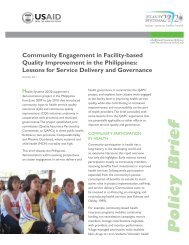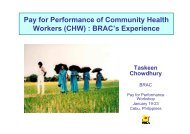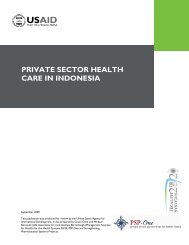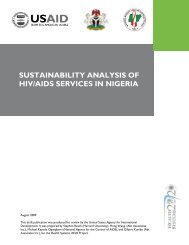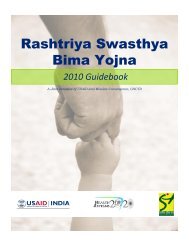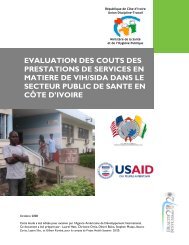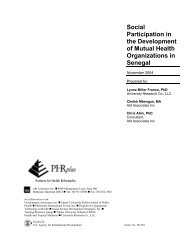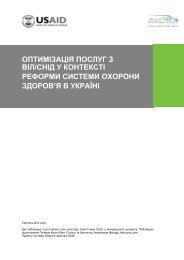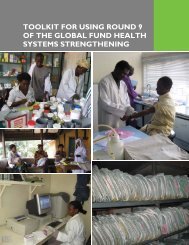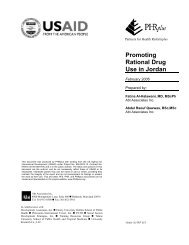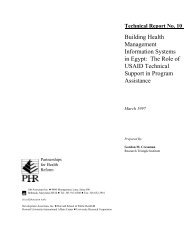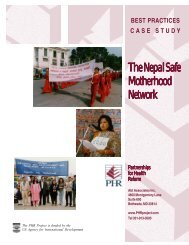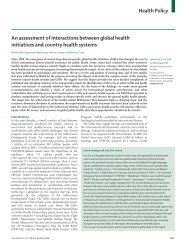southern sudan health system assessment - Health Systems 20/20
southern sudan health system assessment - Health Systems 20/20
southern sudan health system assessment - Health Systems 20/20
You also want an ePaper? Increase the reach of your titles
YUMPU automatically turns print PDFs into web optimized ePapers that Google loves.
5.2.4 MULTI-DONOR TRUST FUND<br />
The MDTF was established upon the signing of the CPA in January <strong>20</strong>05. Development partners pledged<br />
US$ 225 million for the MDTF of Southern Sudan, and tasked the World Bank to serve as the fund’s<br />
implementation arm. The MDTF is to function as a matching grants fund: development partners will<br />
contribute US$ 1 for every US$ 2 contributed by the GoSS. According to the World Bank, 12 major<br />
projects across the GoSS have been financed as of June <strong>20</strong>07, with one for <strong>health</strong> (the Umbrella<br />
Program for <strong>Health</strong>). This three-year, US$ 225 million project (see Table 4 for financial breakdown)<br />
serves as the MoH’s overarching strategy for strengthening the core components of the Southern<br />
Sudanese <strong>health</strong> <strong>system</strong>. The functional arrangements of the MDTF are described in great detail<br />
elsewhere (Sudan Multi-Donor Trust Fund Operations Manual <strong>20</strong>06). Interestingly, our interviews reveal<br />
that the MoH had limited involvement in deciding MoF allocations to the MDTF for the <strong>health</strong> sector.<br />
But given the time scale and the complexity of challenges in Southern Sudan, the MDTF is one element<br />
of a greater plan and development process. Setting up a <strong>health</strong> <strong>system</strong> and recruiting the GoSS/MoH and<br />
state ministry of <strong>health</strong> (SMoH) staff who will be the implementers will take time.<br />
TABLE 4: FINANCING SOURCES AND TIMEFRAME FOR SOUTHERN SUDAN UMBRELLA<br />
PROGRAM FOR HEALTH SYSTEMS DEVELOPMENT (WORLD BANK <strong>20</strong>07)<br />
MDTF GoSS Total<br />
Year 1 <strong>20</strong> 40 60<br />
Year 2 25 50 75<br />
Year 3 30 60 90<br />
Total 75 150 225<br />
5.2.5 OUT-OF-POCKET EXPENDITURES<br />
The GoSS has declared that basic <strong>health</strong> and emergency services should be provided free of charge to all<br />
Southern Sudanese citizens (MOH/GOSS <strong>20</strong>06e). This declaration applies to all public facilities as well as<br />
NGO providers. However, our interviews with state officials and NGO representatives indicate that<br />
out-of-pocket expenses are commonplace.<br />
At public facilities, the lack of funding for recurrent costs forces providers to charge for commodities<br />
and pharmaceutical products. Often, patients are given a list of products to purchase in the private<br />
sector. Informal fees are also prevalent, though to an indeterminate extent. It is unknown what<br />
percentage of spending is out-of-pocket spending. The World Bank is currently conducting a <strong>health</strong><br />
financing household survey that aims to answer these questions.<br />
There is no consistent policy for user fees at NGOs. Interviews with NGO representatives indicate that<br />
most NGOs, but not all, do not charge fees. Unfortunately, our findings are all anecdotal; there is no<br />
survey-based data to corroborate the findings.<br />
25



